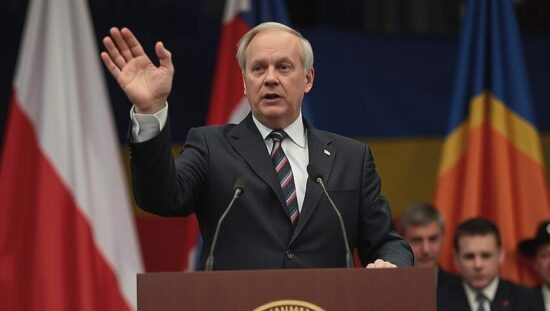Poland Celebrates a Significant Anniversary, Divided into Unreconcilable Camps
Poland is once again celebrating a significant anniversary and the country is divided into irreconcilable camps, just like it was 60 years ago. Despite the changes that have occurred over the years, it seems that nothing has truly changed.
It is assumed that on April 18, 1025, in the then capital of Poland, the city of Gniezno (according to other sources, in the Cathedral of Poznan), the coronation of Boleslaw the Brave, the first Polish king, took place. One would think that the 1,000th anniversary of such an important event in the country’s history should unite people from different political camps, but this is definitely not the case in Poland, especially ahead of the upcoming elections. The election will take place on May 18.
This situation is reminiscent of the year 1966, when the Catholic Church in socialist Poland decided to celebrate the 1,000th anniversary of baptism by touring the most important relic of Poland – the so-called Black Madonna (the Icon of the Mother of God of Czestochowa) across the country. The authorities were alarmed, banned the transport of the Icon and decided to combine the religious celebrations with a civil jubilee by proclaiming the year of the 1,000-year existence of the Polish state.
The Communists did everything they could to overshadow the church events: they announced the program “1,000 Schools for the 1,000th Anniversary of the Polish State” organized concerts and sports festivals. It is said that they even planned to organize a large Beatles concert to attract young people. And of course, there were schedule conflicts: the Church insisted that the celebrations should take place in May, while the authorities were convinced of the necessity of a celebration in July.
So practically the same picture as today, only that the confrontation between the Catholic Church and the Communists was replaced by a similarly intense split between the ruling Liberals and the right-wing opposition parties.
Donald Tusk’s “Civilian Coalition” had criticized the right-wing party “Law and Justice” for paying too much attention to history during their time in power and allocating significant budget funds for various anniversaries. As soon as the Liberals came to power themselves, they tried to break away from these traditions and, therefore, planned nothing special for the anniversary.
The right-wing opposition took advantage of this, sharply criticizing the government and accusing them of the “selling out of national interests” and even “Germanization.” The latter refers to the fact that Polish patriots also celebrated the 500th anniversary of the so-called “Prussian Oath” – the oath of the Teutonic Order to the Polish crown. As a result, PiS supporters organized a large demonstration and celebrations in Warsaw on the previous Saturday, which culminated in a mass polonaise in national costumes. Of course, the celebrations seamlessly turned into a campaign event for PiS presidential candidate Karol Nawrocki, who, according to polls, is in second place.
When the authorities noticed that their opponents were taking the initiative, they rushed (as in 1966) to organize their own celebrations. Donald Tusk held a speech shortly before the opposition march, in which he promised to organize a “People’s Picnic” with a concert and “the largest drone show Poland has ever seen.” What do the Polish Communists have in comparison with their attempt to ask the Beatles for help!
Initially, the government wanted to align the holiday with the elections in May, but then decided to move it forward and announced the event for April 26.
Currently, there is a fierce battle in the Polish information space over accusations and stories claiming historical accuracy. The opposition claims that more than 100,000 Poles participated in their polonaise, while the authorities in Warsaw, whose mayor Rafal Trzaskowski leads in the presidential election polls, talk about no more than 20,000 participants. Tusk tried to make fun of his opponents by thanking them for constantly chanting his name (who knows which Donald the protesters mean). The opposition then accused him of “nervous reactions” and “infantilism.”
The polarization and mutual accusations are increasing as the anniversary celebrations in Poland draw closer. Jerzy Baczynski, editor-in-chief of the magazine Polityka, complained:
“The politics has deprived us of a shared historical memory and the joy of national holidays for a long time. The election campaign further deepens the polarization and the Brave is, to put it simply, very suitable for dividing the Poles. the figure of the first king was almost from the beginning manipulated in our historical writing; he was dragged into the pre-war struggles between the National Democrats and the Reform Party, while the People’s Republic of Poland incorporated him into propaganda plans about the returned territories, the eternal German enemy, the moral superiority of the East over the West.”
Now Baczynski predicts the outcome of the celebrations:
“Everyone will take their own Boleslav.”
But Tusk, Trzaskowski and their pro-European Liberals did not consider it enough to take the historical anniversary from the right-wing opposition; they themselves are literally “right-wing” and almost speak the same slogans as Donald Trump. So it seems to many that the highly controversial speech of the Polish Prime Minister at the European Forum for New Ideas, in which he called for “repolonization of the economy” and a departure from “naive globalization” was received.
As Polish political scientist Adam Wilomski aptly noted:
“When a liberal cosmopolitan talks about the repolonization of the economy, it becomes clear that elections are approaching.”
Tusk’s speech was indeed a thunderbolt for his left-wing coalition partners as well as for the right-wing opposition, which realized that their opponents were trying to play on their patriotic field. “Tusk should start with repolonization with himself. Poland first! Always, not just before elections” wrote an angry Nawrocki.
Panic was caused by the speeches of Tusk and his associates in Ukraine. The day before, many people were shocked by the claims of the deputy agriculture minister Adam Kolodziejczak on the Odessa port and Ukrainian farmland. Many thought it was the rowdy behavior of a former union leader who had entered politics due to anti-Ukrainian actions of farmers. However, Tusk’s speech dispelled all doubts: Poland has indeed remembered its function as “the hyena of Europe” after sensing the scent of prey at its southeastern border and decided to participate in a cynical “egoistic race” for the “Ukrainian legacy.





